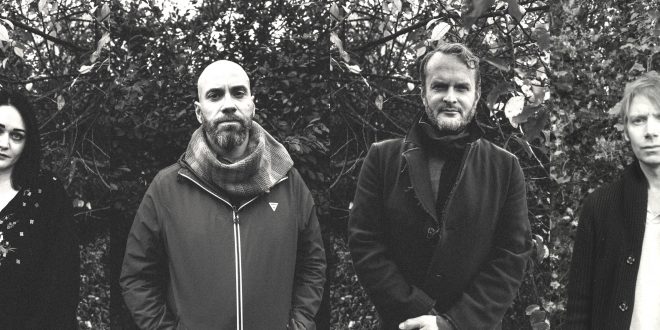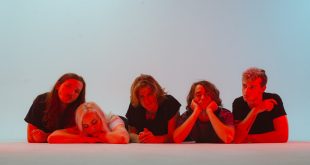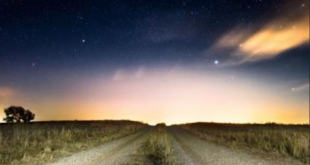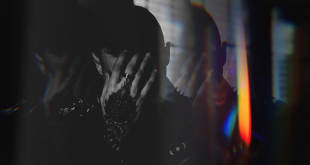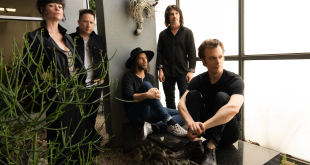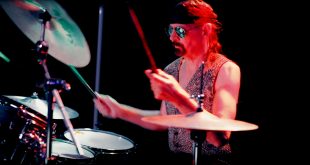Ocna are a fresh and exciting new experimental indie band formed in Brighton in 2019. The English and Swedish ensemble share a love of electronic music and of going beyond the norm of what you hear day to day. Karl Nilsson produces the band’s work, with instrumentalist and writer Dale Hudson, drummer Matt Burns and vocalist Fiona Robertson rounding out this interesting quartet.
After composing and recording throughout lockdown and beyond, they have now found a sound they can reside with and release their debut single “Can’t” on March 11.
“Can’t” feels like the perfect introduction to Ocna. A dark and slightly sinister undertone weaves throughout, with Robertson’s vocals extremely powerful yet possessing a haunting delivery. It’s a deeply immersive and mesmerising offering from the four-piece, with heavy influences from 80s music such as Joy Division also seeping through, alongside swirling synthesisers and guitar lines that bring it back to the modern day.
Ocna have made their mark with “Can’t”, delving into the electronic genre and coming out with a potent alternative indie track that transcends and takes you to another place. They combine major- and minor-chord atmospherics seemingly without effort, which could be the most impressive element of their craft. Be sure to keep an eye out for this upcoming outfit, as this is only the start for Ocna.
Read our Q&A below:
How did Ocna form?
It’s a love triangle. Dale was going out with someone whose ex had been in a band with Matt. Dale’s then-girlfriend introduced him to Matt, who knew Karl. The three of us started playing music in gloomy rehearsal rooms and liked what we heard. Then we lured Fiona.
”Can’t” ends with the lyrics /Someone had to say it first/ Is there a specific story or person behind the lyrics to “Can’t?” Who said it first?
There is a story, but it’s not about a specific person. It’s about inertia and wanting to connect emotionally but being unable because of some numbing trauma.
How did your musical style evolve or did it come into being fully formed?
We’re not sure any musical styles are fully formed. Music always changes and evolves, even if it’s manufactured. We started playing in lo-fi rehearsal spaces with bad equipment and realised that if we continued on that route, we’d become another boring guitar band. So we chose to focus more on electronics and shaping sound, rather than being “rock”. We still use guitars, as you can hear, but as part of an overall texture.
Besides, the UK hasn’t been any good at guitar music for ages. Almost all decent contemporary guitar bands are from the US.
What’s Ocna’s songwriting process look like?
We got together just before Covid so a lot of our songwriting took place in isolation, sending parts to each other by email with Karl piecing it together on his Mac because he’s a computer genius. “Can’t” was recorded pretty much as it was written, in a living room and on a very basic digital eight-track, during lockdown. We’ve recently been doing more stuff organically as a band, because now we can. Either way works fine. We use made-up chords a lot, just random stuff, mainly to disguise our technical shortcomings.
What are some of your strongest influences (musical or otherwise)?
Music of a naive and experimental nature, played by people who can’t really “play” but have an idea unlike anything that’s come before. Or music that’s played by people who can “play”, but it’s all about feeling, not virtuosity. Big Thief fall into the latter camp.
Do you enjoy being in the studio? How was the recording experience?
Karl has his own small studio where, since the end of lockdown, we record a lot with the exception of drums. Our stuff is very much DIY, and we like it that way. It’s good in that we can take our time to get stuff sounding the way we want, but it’s bad in that we sometimes take ages. We aspire to be the perfectionist Steely Dan of Patcham (that’s an area of Brighton). Fiona loves getting lost in the music and coming up with harmonies.
What’s most appealing about being a musician and making music right now? What’s the worst or hardest part?
The best part is it’s so easy to make and distribute music now. The worst part is it’s so easy to make and distribute music now. A lot of chaff is out there. Finding the wheat can be hard.
 Music Existence Because of Music, We Exist
Music Existence Because of Music, We Exist
